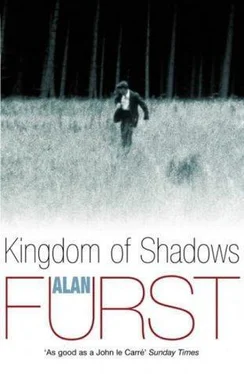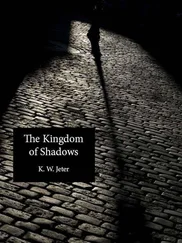Alan Furst - Kingdom of Shadows
Здесь есть возможность читать онлайн «Alan Furst - Kingdom of Shadows» весь текст электронной книги совершенно бесплатно (целиком полную версию без сокращений). В некоторых случаях можно слушать аудио, скачать через торрент в формате fb2 и присутствует краткое содержание. Жанр: Шпионский детектив, на английском языке. Описание произведения, (предисловие) а так же отзывы посетителей доступны на портале библиотеки ЛибКат.
- Название:Kingdom of Shadows
- Автор:
- Жанр:
- Год:неизвестен
- ISBN:нет данных
- Рейтинг книги:5 / 5. Голосов: 1
-
Избранное:Добавить в избранное
- Отзывы:
-
Ваша оценка:
- 100
- 1
- 2
- 3
- 4
- 5
Kingdom of Shadows: краткое содержание, описание и аннотация
Предлагаем к чтению аннотацию, описание, краткое содержание или предисловие (зависит от того, что написал сам автор книги «Kingdom of Shadows»). Если вы не нашли необходимую информацию о книге — напишите в комментариях, мы постараемся отыскать её.
Kingdom of Shadows — читать онлайн бесплатно полную книгу (весь текст) целиком
Ниже представлен текст книги, разбитый по страницам. Система сохранения места последней прочитанной страницы, позволяет с удобством читать онлайн бесплатно книгу «Kingdom of Shadows», без необходимости каждый раз заново искать на чём Вы остановились. Поставьте закладку, и сможете в любой момент перейти на страницу, на которой закончили чтение.
Интервал:
Закладка:
Which was back on Van Eycklei, on the second floor of an imposing gray stone building, and rather splendid: Persian carpets, a vast mahogany breakfront crowded with old books, an ornate desk with a green baize inset.
The elder Shabet settled himself at the desk. “So then, how can we help you?”
“An acquaintance in Paris gave me your name.”
“Paris. Oh, are you Monsieur Andre?”
“It’s the name I asked him to use.”
Shabet looked him over. He was in his sixties, Morath thought, with fine features and silver hair, a white silk yarmulke on the back of his head. A comfortable man, wealthy, and confident in what he knew about the world. “The times we live in,” he said, forgiving Morath a small deception. “Your friend in Paris sent someone up to see me. Your interest is, I believe, investment.”
“More or less. The money is in Hungarian pengo, about two million.”
“You don’t interest yourself in shape or quality, that you leave to us. Simply a question of conversion.”
“To diamonds.”
Shabet folded his hands on the desk, his thumbs pressed together. “The stones are available, of course.” He knew it wasn’t that simple.
“And once we own them, we would like them sold.”
“By us?”
“By your associates, perhaps family associates, in New York. And the money paid into an account in America.”
“Ah.”
“And if, to save the expense of shipping, the firm in New York was to use its own inventory, stones of equal value, that would not concern us.”
“You have in mind a letter, I think. Us to them, and the accounting worked out within the family, is that it?”
Morath nodded and handed Shabet a sheet of cream-colored writing paper.
Shabet took a pince-nez from his breast pocket and settled it on the bridge of his nose. “United Chemical Supply,” he read. “Mr. J. S. Horvath, treasurer. At the Chase National Bank, the Park Avenue branch.” He laid the paper on the desk and put the pince-nez back in his pocket.
“Monsieur Andre? What sort of money is this?”
“Donated money.”
“For espionage?”
“No.”
“What then?”
“For certain funds. To be available in case of-national emergency.”
“Am I doing business with the Hungarian government?”
“You are not. The money is given by private donors. It is not Fascist money, not expropriated, not extorted, not stolen. The politics of this money is the politics of what the newspapers call ‘the Shadow Front.’ Which is to say, liberals, legitimists, Jews, intellectuals.”
Shabet wasn’t pleased, he frowned, the look of a man who might want to say no but can’t. “It’s a great deal of money, sir.”
“We ask just this single transfer.”
Shabet looked out the window, a few flakes of snow drifted through the air. “Well, it’s a very old method.”
“Medieval.”
Shabet nodded. “And you trust us to do this? There will be no receipt, nothing like that.”
“You are, we believe, an established firm.”
“I would say we are, Monsieur Andre, I would have to say we are. Since 1550.”
Shabet took the sheet of paper from his desk, folded it in half, and slipped it in the desk drawer. “There was a time,” he said, “when we might have suggested you do business with somebody else. But now-” It wasn’t necessary to finish the sentence, and Shabet didn’t bother. “Very well,” he said, “you have the money with you?”
It was dusk by the time they tried to find their way out of Antwerp. They had a city map, apparently drawn by a high-spirited Belgian anarchist, and argued with each other as the Peugeot wound through the narrow streets, Morath stabbing his finger at the map and telling Balki where they were, Balki looking at the street signs and telling Morath where they weren’t.
The windshield wipers squeaked as they swept wet snow back and forth across the cloudy glass. In one street, a fire, it took forever to back the car out. They turned into the next street behind a junk man’s horse and wagon, then tried another, which led to a statue of a king and a dead end. Balki said, “Merde,” got the car going in the opposite direction, took the next left.
Which was, for some reason, vaguely familiar to Morath, he’d been there before. Then he saw why-the shop called Homme du Monde, Madame Golsztahn’s tuxedo-rental business. But there was no mannequin in the window. Only a hand-lettered sign saying FERME.
“What is it?” Balki said.
Morath didn’t answer.
Maybe the Belgian border guards didn’t care who came and went, but the French customs inspectors did. “The watch, monsieur. Is it, ah, new?”
“Bought in Paris,” Balki told them.
It was hot in the customs shed, an iron stove glowed in one corner, and it smelled of wet wool from the inspectors’ capes. A Russian? And a Hungarian? With residence permits? Work permits? The Hungarian with a diplomatic passport? In a borrowed automobile?
So then, just exactly what kind of, business had them crossing the border in a snowstorm? Perhaps we’ll have a look in the trunk. The key, monsieur, if you please.
Morath began to calculate time. To be at the cafe on the rue Guisarde at ten o’clock, they should have left this hell an hour earlier. Outside, a truck driver honked his horn. The traffic began to back up as one of the inspectors tried to reach the Paris prefecture on the telephone. Morath could hear the operator’s voice as she argued with the inspector, who held his hand over the receiver and said to his supervisor, “She says there’s a line down in Lille.”
“Our calls don’t go through Lille, she of all people should know that!”
Morath and Balki exchanged a look. But the chief officer grew bored with them a few minutes later and sent them on their way with an imperious flip of the hand. If they insisted on being foreigners it certainly wasn’t his fault.
Out on Route 2, snow.
The Peugeot crawled behind an old Citroen camionnette with the name of a Soissons grocery painted on the rear door. Balki swore under his breath and tried to pass, the wheels spun, the Peugeot began to fishtail, Balki stamped on the brake, Morath saw the white, furious face of the camionnette ‘s driver as it skidded past, the Peugeot spun in a circle, then plowed into a field, wheels bouncing on ruts beneath the snow.
They came to rest a few feet from a large plane tree, its trunk scarred by the indiscretions of past motorists. Balki and Morath stood in the falling snow and stared at the car. The right rear tire was flat.
Ten minutes to midnight, the rue Guisarde white and silent in the whispering snow, the lights of the cafe an amber glow at the end of the street. He saw her right away, the last customer, looking very sorrowful and abandoned, sitting hunched over a book and an empty cup of coffee.
He sat down across from her. “Forgive me,” he said.
“Oh, it doesn’t matter.”
“A nightmare, out on the roads. We had to change a tire.”
He took her hands.
“You’re wet,” she said.
“And cold.”
“Maybe you should go home. It hasn’t been a good night.”
He didn’t want to go home.
“Or you could come upstairs. Dry your hair, at least.”
He rose. Took a few francs from his pocket and put them on the table for the coffee.
A very small apartment, a single room with a bed in an alcove and a bathroom. He took off his overcoat, she hung it by the radiator. Put his jacket in the armoire and his soaked shoes on a sheet of newspaper.
They sat on an elaborate old sofa, a Victorian horror, the sort of thing that, once it came up five flights of stairs, was never going anywhere again. “Dear old thing,” she said affectionately, smoothing the brown velvet cushion with her hand. “She often plays a role in the D. E. Cameron novels.”
Читать дальшеИнтервал:
Закладка:
Похожие книги на «Kingdom of Shadows»
Представляем Вашему вниманию похожие книги на «Kingdom of Shadows» списком для выбора. Мы отобрали схожую по названию и смыслу литературу в надежде предоставить читателям больше вариантов отыскать новые, интересные, ещё непрочитанные произведения.
Обсуждение, отзывы о книге «Kingdom of Shadows» и просто собственные мнения читателей. Оставьте ваши комментарии, напишите, что Вы думаете о произведении, его смысле или главных героях. Укажите что конкретно понравилось, а что нет, и почему Вы так считаете.












